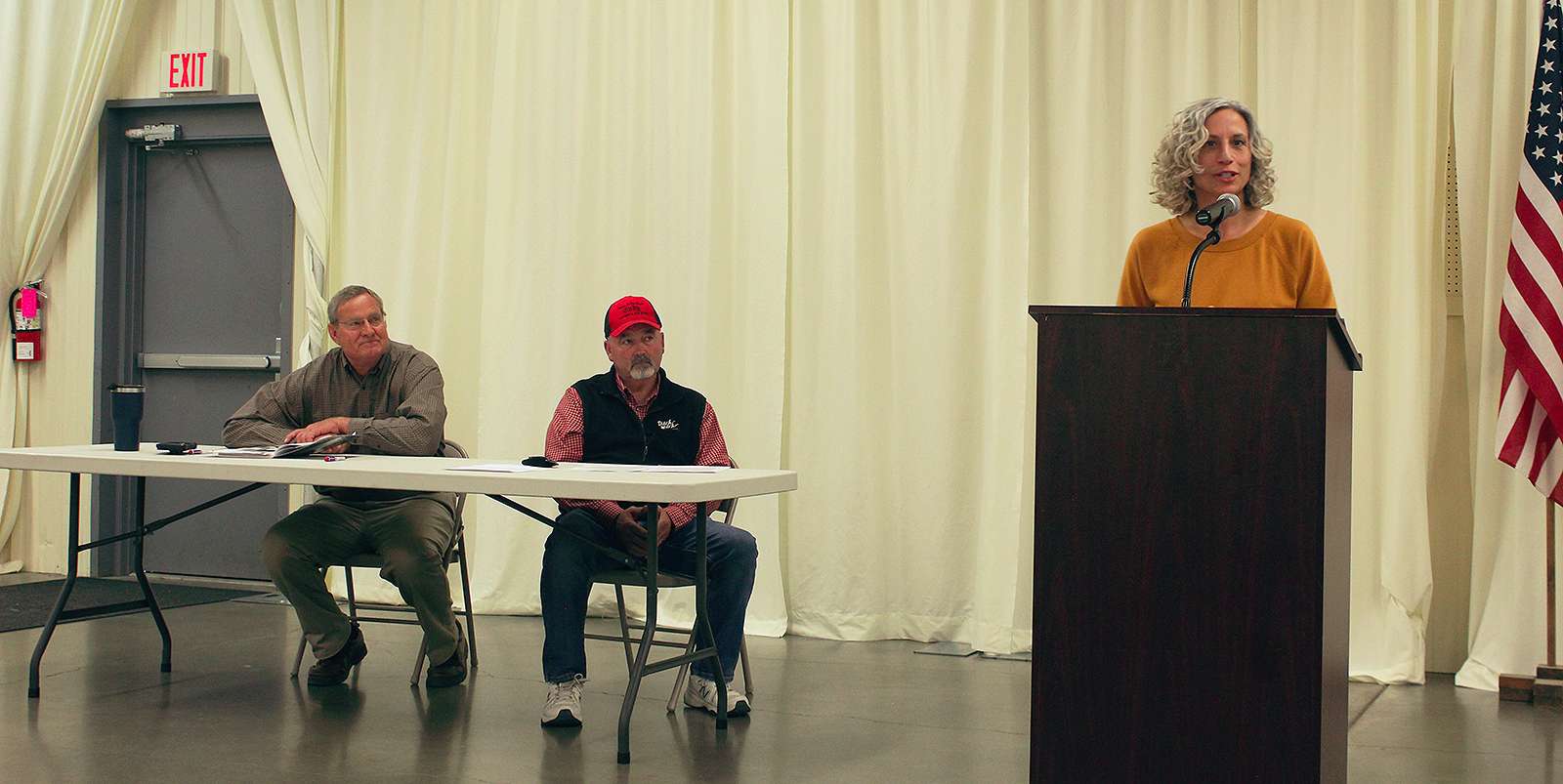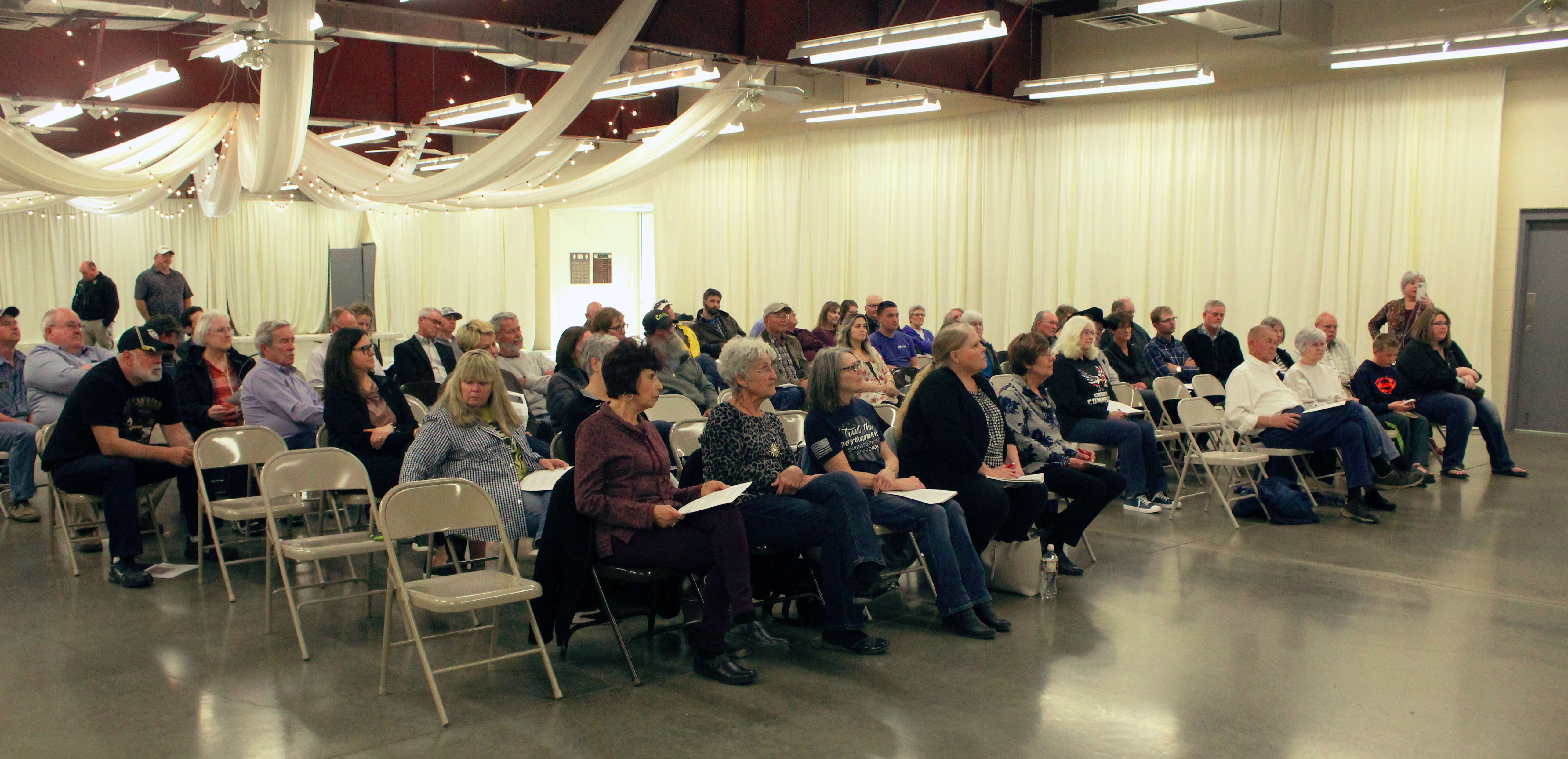
By CRISTINA JANNEY
Hays Post
Community members gathered Tuesday to express opposition to the proposed Hays USD 489 bond issue, chiefly citing inflation as a reason now is not the right time to build a new school.
About 60 people attended the meeting, not all of whom were against the school district's $143.5 million bond proposal.
Joe Wilkerson, one of the speakers at the meeting, said sharp increases in the cost of energy, food and gasoline are reasons not to pass a bond issue right now.
“Now is not the time, in our opinion, to build new schools,” he said. “We may need to do some repairs and some updates. I don’t think anyone’s against that.
“What we need to do most is take care and hunker down, because for now, we don’t know what’s coming forward.”

Adams Peters, who was billed as a conservative author, said the war in Ukraine will likely increase the cost of fertilizer and food costs, possibly leading to food shortages.
"This is going to be hardest on people who are already struggling to make ends meet," he said. "This is often the elderly, single parents and families with low incomes."
He continued, "If we raise property taxes, it's going to lead to higher rent. If we impose a sales tax, it's going to cost more at the register. The people who are going to be hit hardest are the ones who can least afford it.
"We need to ask if adding more cost to them is reasonable."
Peters said although the bond has been billed as a way to attract more people to Hays, it could push out low-income families who are already here.
One mother who home-schools said she can't afford to pay for the taxes that would be associated with the school bond.
"What am I supposed to give up for my son to pay for that?" she said.
Cathy Hopkins, who ran for school board but was not elected, said new schools do not equal better test scores.

She cited test scores from the Kansas Policy Institute, a conservative-leaning think tank, that showed Liberal, Garden City, Dodge City and Great Bend all had lower test scores on 10th-grade math and English assessments in 2019 compared to Hays.
All the those schools except Hays have passed bonds in the last 10 years.
However, Mike Morley, who has been on the last two bond committees, at a later point in the evening said these communities have much different student demographics compared to Hays. Liberal, Garden City and Dodge City all have high percentages of students from immigrant families who do not speak English in their homes.
He said the higher percentages of English language learners in those schools could account for the differences in the test scores.
"Do fancy new spaces and moveable walls, which were pictures that were shown during those committee meetings ... do they help the kids learn better? Do they really make test scores better?" Hopkins said.
DLR, the district's architectural firm, cites in its work with schools a study published in European Scientific Journal that found learning spaces have effects on student engagement. Higher student engagement in turn correlated to increases in student academic performance, according to the study.
Hopkins said the school's architect encouraged the bond committee to dream big. She said this is not the reality when you go to your loan officer and ask for a loan on a home.
"I just want a [bond] that is responsible to our whole community," she said. "That is every member. Our kids that are in high school now are going to be in their 40s when this is paid off if it passes."
Multiple people in the group asked how much DLR will be paid if the bond passes.
That information was not available at the meeting. However, Hays Post was able to obtain further information from the school district.
If the bond passes, DLR will receive 0.33 percent of the bond. That will be $473,550. DLR has already invested 2,800 hours without being paid. If this bond fails, the district can request an additional bond attempt at no extra cost.
DLR will receive additional fees for the design of the schools and renovation projects. Those fees will depend on the complexity of the project, according to DLR.
Hopkins also expressed concerns that the district was closing smaller, neighborhood schools and consolidating into larger four-section elementary schools.
Wilkerson said the school district has closed four schools in the last 20 years, including Catharine, Munjor, Washington and Kennedy Middle School.
Morley said only about 18 students were attending Munjor when that school was closed as an elementary school. Catharine also had low attendance, and Washington was consuming a disproportionate amount of the capital budget for repairs because of its age.
Hopkins said capital funds are being misused. She alleged a new office space and private bathroom was built for the new principal at the high school. Chrisy Crough, USD 489 outreach coordinator, said HHS Principal Shawn Henderson did not have a private bathroom. The administration offices were reconfigured to create office space for the new mental health program at HHS.
Again citing the Kansas Policy Institute, Hopkins said between 1993 and 2021, the state has seen an 8 percent increase in enrollment, 17 percent increase in classroom teachers, 42 percent increase in managers and 49 percent increase in non-teachers.
Cindy Weigel, Fort Hays State University administrative assistant, said she is concerned about how traffic will be handled if the new high school is built on 13th Street
She said she once lived in the area of the high school and was hit by a high school student. She said she was concerned the school district has not announced a specific plan for traffic.
Weigel also expressed concerns about increases in recent valuations.
Doug Williams, Grow Hays executive director, said later in the meeting although valuations have been released, tax bills have not. He said in a story on Hays Post on Monday that assessed valuation increases do not necessarily equal tax increases.
Morley said the interest rate for the bond will be locked in if the bond issue passes, just as you lock in your interest rate when you buy a home.
The exact payoff for the bond including interest will be affected by several factors. The data on all these factors is not available at this point.
The district does not know what the exact interest rate will be when the bond is financed.
Another variable is the amount of sales tax collected by the half-cent sales tax. Any additional revenue over the projections would lead to early repayment of the bond and therefore reduce the total interest paid, according to Piper Sander, the district's bond counsel.
Increases in the assessed valuation could also result in the bond being paid off sooner and a reduction in the amount of bond interest paid.
Weigel said she is tired of new taxes.
"With new high schools and new roads and more taxes, will it ever end?" she said.
Weigel said she was concerned rents will increase in Hays if the bond passes and that will make it even more difficult for families to save and invest in homes.
She criticized the special election. It will cost the district $20,000. She alleged the district chose a special election instead of the primary because it would mean lower voter turnout.
Morley said this was not correct. He said a special election was chosen because questions that are down-ballot from congressional races usually receive less attention. Many voters vote for the major races and don't vote for races at the end of the ballot, he said.
Morley encouraged people to vote in the special election, no matter what their vote may be. Early voting starts Monday at the Ellis County Administrative Center, 718 Main, Hays. Election Day is May 10.



